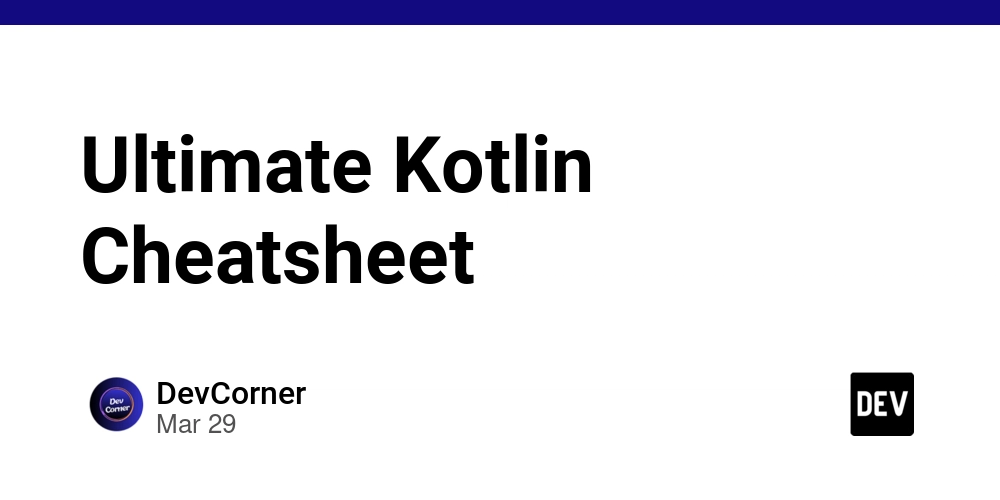Table of Contents
- Basics
- Variables & Data Types
- Control Flow
- Functions
- Collections
- Classes & Objects
- Null Safety
- Coroutines
- Extension Functions
- Functional Programming
- Learning Resources
Basics
Hello World
fun main() {
println("Hello, World!")
}
Comments
// Single-line comment
/*
Multi-line
comment
*/
/**
* KDoc comment
* @param args command line arguments
*/
Variables & Data Types
Variable Declaration
val immutable: String = "Cannot be changed" // Read-only (immutable)
var mutable: String = "Can be changed" // Mutable
mutable = "New value"
// Type inference
val inferred = "Type is inferred as String"
Basic Types
// Numbers
val byte: Byte = 127 // 8 bits
val short: Short = 32767 // 16 bits
val int: Int = 2147483647 // 32 bits
val long: Long = 9223372036854775807L // 64 bits
val float: Float = 3.14f // 32 bits
val double: Double = 3.14159 // 64 bits
// Characters and strings
val char: Char = 'A'
val string: String = "Hello"
val multiline: String = """
This is a
multiline string
No escaping needed
"""
// Boolean
val boolean: Boolean = true
// Type conversion
val longFromInt: Long = int.toLong()
String Templates
val name = "Kotlin"
println("Hello, $name!") // Simple variable
println("Array size: ${array.size}") // Expression
Control Flow
Conditionals
// If expression (returns a value)
val max = if (a > b) a else b
// If statement
if (x > 0) {
println("Positive")
} else if (x < 0) {
println("Negative")
} else {
println("Zero")
}
// When expression (enhanced switch)
when (x) {
1 -> println("One")
2, 3 -> println("Two or Three")
in 4..10 -> println("Between 4 and 10")
!in 20..30 -> println("Not between 20 and 30")
is String -> println("Is a String of length ${x.length}")
else -> println("Otherwise")
}
// When as an expression
val result = when (x) {
0, 1 -> "Binary digit"
else -> "Not a binary digit"
}
Loops
// For loop with range
for (i in 1..5) {
println(i) // 1, 2, 3, 4, 5
}
// For loop with step
for (i in 1..10 step 2) {
println(i) // 1, 3, 5, 7, 9
}
// For loop downward
for (i in 5 downTo 1) {
println(i) // 5, 4, 3, 2, 1
}
// For loop with indices
for (i in array.indices) {
println(array[i])
}
// For loop with index
for ((index, value) in array.withIndex()) {
println("Element at $index is $value")
}
// While loop
while (condition) {
// code
}
// Do-while loop
do {
// code
} while (condition)
Loop Control
// Break
for (i in 1..10) {
if (i == 5) break
println(i) // 1, 2, 3, 4
}
// Continue
for (i in 1..10) {
if (i % 2 == 0) continue
println(i) // 1, 3, 5, 7, 9
}
// Labeled break/continue
outer@ for (i in 1..10) {
for (j in 1..10) {
if (i * j > 50) break@outer
}
}
Functions
Basic Function
fun greet(name: String): String {
return "Hello, $name!"
}
// Single-expression function
fun greet(name: String): String = "Hello, $name!"
// Type inference for return value
fun greet(name: String) = "Hello, $name!"
Parameters
// Default parameters
fun greet(name: String, greeting: String = "Hello") = "$greeting, $name!"
// Named arguments
greet(greeting = "Hi", name = "Kotlin")
// Variable number of arguments (varargs)
fun sum(vararg numbers: Int): Int {
return numbers.sum()
}
sum(1, 2, 3, 4) // 10
// Spread operator for varargs
val numbers = intArrayOf(1, 2, 3)
sum(*numbers)
Local Functions
fun outer() {
fun inner() {
// Has access to outer's scope
}
inner()
}
Infix Functions
infix fun Int.plus(other: Int): Int = this + other
val result = 1 plus 2 // Same as 1.plus(2)
Operator Overloading
operator fun Point.plus(other: Point): Point {
return Point(x + other.x, y + other.y)
}
val result = point1 + point2 // Calls point1.plus(point2)
Higher-Order Functions
// Function that takes a function as parameter
fun operation(x: Int, y: Int, op: (Int, Int) -> Int): Int {
return op(x, y)
}
// Calling with lambda
operation(1, 2) { a, b -> a + b }
// Function that returns a function
fun multiplier(factor: Int): (Int) -> Int {
return { it * factor }
}
val double = multiplier(2)
double(5) // 10
Collections
Creating Collections
// Immutable collections (preferred)
val list = listOf(1, 2, 3) // List
val set = setOf("apple", "banana") // Set
val map = mapOf("a" to 1, "b" to 2) // Map
// Mutable collections
val mutableList = mutableListOf(1, 2, 3)
val mutableSet = mutableSetOf("apple", "banana")
val mutableMap = mutableMapOf("a" to 1, "b" to 2)
// Empty collections
val emptyList = emptyList<String>()
val emptySet = emptySet<Int>()
val emptyMap = emptyMap<String, Int>()
// Array
val array = arrayOf(1, 2, 3)
val intArray = intArrayOf(1, 2, 3) // Primitive int[]
Collection Operations
// Element access
list[0] // First element
list.first() // First element
list.last() // Last element
map["a"] // Value for key "a"
// Adding elements (mutable collections)
mutableList.add(4)
mutableSet.add("cherry")
mutableMap["c"] = 3
// Removing elements (mutable collections)
mutableList.remove(2)
mutableSet.remove("apple")
mutableMap.remove("a")
// Collection transformations
val doubled = list.map { it * 2 } // [2, 4, 6]
val even = list.filter { it % 2 == 0 } // [2]
val sum = list.reduce { acc, i -> acc + i } // 6
val grouped = list.groupBy { it % 2 } // {1=[1, 3], 0=[2]}
val flattened = listOf(listOf(1), listOf(2, 3)).flatten() // [1, 2, 3]
// Checking elements
list.contains(2) // true
2 in list // true
list.any { it > 2 } // true
list.all { it < 10 } // true
list.none { it < 0 } // true
list.count { it % 2 == 0 } // 1
// Collection information
list.size // 3
list.isEmpty() // false
list.isNotEmpty() // true
// Finding elements
list.find { it > 2 } // 3
list.findLast { it < 3 } // 2
list.indexOf(2) // 1
// Sorting
list.sorted() // Natural order
list.sortedDescending() // Reverse natural order
list.sortedBy { it % 2 } // Custom order
Classes & Objects
Class Declaration
class Person {
var name: String = ""
var age: Int = 0
fun introduce() {
println("I'm $name, $age years old")
}
}
// Instantiation
val person = Person()
person.name = "John"
person.age = 25
person.introduce()
Constructors
// Primary constructor
class Person(val name: String, var age: Int) {
// Init blocks run in sequence with property initializers
init {
require(age >= 0) { "Age cannot be negative" }
}
}
// Secondary constructor
class Person {
val name: String
var age: Int
constructor(name: String, age: Int) {
this.name = name
this.age = age
}
constructor(name: String) : this(name, 0)
}
Properties
class Person {
// Backing field auto-generated
var name: String = ""
get() = field.uppercase()
set(value) {
field = value.trim()
}
// Custom getter (read-only property)
val isAdult: Boolean
get() = age >= 18
// Late-initialized property (no initial value needed)
lateinit var job: String
// Lazy property - initialized on first access
val socialSecurityNumber: String by lazy {
calculateSSN() // Expensive operation
}
}
Data Classes
// Automatically implements equals(), hashCode(), toString(), copy()
data class User(val name: String, val age: Int)
val user1 = User("John", 25)
val user2 = user1.copy(age = 26)
val (name, age) = user1 // Destructuring declaration
Inheritance
// All classes are final by default
open class Animal(val name: String) {
open fun makeSound() {
println("Some sound")
}
}
class Dog(name: String) : Animal(name) {
override fun makeSound() {
println("Woof!")
}
}
Abstract Classes
abstract class Shape {
abstract val area: Double
abstract fun draw()
// Non-abstract function
fun display() {
println("Displaying shape with area: $area")
}
}
class Circle(val radius: Double) : Shape() {
override val area: Double
get() = Math.PI * radius * radius
override fun draw() {
println("Drawing a circle")
}
}
Interfaces
interface Clickable {
// Abstract property
val clickCount: Int
// Abstract method
fun onClick()
// Method with default implementation
fun showOff() {
println("I'm clickable!")
}
}
interface Focusable {
fun showOff() {
println("I'm focusable!")
}
}
// Multiple interface implementation
class Button : Clickable, Focusable {
override val clickCount: Int = 0
override fun onClick() {
println("Button clicked")
}
// Must override conflicting method
override fun showOff() {
super<Clickable>.showOff()
super<Focusable>.showOff()
}
}
Singleton (Object)
object Singleton {
val property = "I'm a singleton"
fun method() = "Only one instance exists"
}
// Usage
Singleton.property
Singleton.method()
Companion Object
class MyClass {
companion object Factory {
fun create(): MyClass = MyClass()
}
}
// Usage (like static methods in Java)
val instance = MyClass.create()
Enum Classes
enum class Direction {
NORTH, EAST, SOUTH, WEST
}
// Enum with properties and methods
enum class Color(val rgb: Int) {
RED(0xFF0000),
GREEN(0x00FF00),
BLUE(0x0000FF);
fun containsRed(): Boolean = (rgb and 0xFF0000 != 0)
}
Sealed Classes
// Restricted class hierarchy
sealed class Result {
class Success(val data: Any) : Result()
class Error(val message: String) : Result()
object Loading : Result()
}
// Ideal for use with when
fun handleResult(result: Result) = when (result) {
is Result.Success -> println("Success: ${result.data}")
is Result.Error -> println("Error: ${result.message}")
is Result.Loading -> println("Loading...")
// No else branch needed as all subclasses are covered
}
Type Aliases
typealias ClickHandler = (Button, ClickEvent) -> Unit
typealias StringMap = Map<String, String>
Null Safety
Nullable Types
// Non-nullable type
var nonNull: String = "value"
nonNull = null // Compilation error
// Nullable type
var nullable: String? = "value"
nullable = null // OK
Safe Calls
// Returns null if user is null
val length = user?.name?.length
// Chain of safe calls
val city = user?.address?.city
// Safe call with let
user?.let {
println("User name is ${it.name}")
}
Elvis Operator
// Default value if null
val length = str?.length ?: 0
// Throw exception if null
val name = user?.name ?: throw IllegalArgumentException("User must have a name")
Not-null Assertion
// Throws NullPointerException if null
val length = str!!.length
Safe Casts
// Returns null if cast fails
val str: String? = value as? String
Platform Types
// Types coming from Java are treated as platform types (neither nullable nor non-null)
// import java.util.Date
// fun getDate(): Date = Date() // Java method
// val date: Date = getDate() // Treated as non-nullable
// val nullableDate: Date? = getDate() // Treated as nullable
Coroutines
Basic Coroutine
import kotlinx.coroutines.*
fun main() = runBlocking {
launch {
delay(1000)
println("World!")
}
println("Hello,")
}
// Prints: Hello, (waits 1 second) World!
Coroutine Builders
// launch - fire and forget
launch {
// Coroutine code
}
// async - returns a result
val deferred = async {
// Coroutine code that returns a value
"Result"
}
val result = deferred.await()
// runBlocking - bridges blocking and non-blocking worlds
runBlocking {
// Coroutine code
}
// coroutineScope - creates a new scope and waits for all children
coroutineScope {
launch { delay(1000) }
launch { delay(2000) }
} // Waits for both launches to complete
Coroutine Context & Dispatchers
// Dispatchers
launch(Dispatchers.Default) { /* CPU-intensive work */ }
launch(Dispatchers.IO) { /* I/O operations */ }
launch(Dispatchers.Main) { /* UI updates */ }
// Named coroutines for debugging
launch(CoroutineName("my-coroutine")) { /* ... */ }
// Combined context
launch(Dispatchers.IO + CoroutineName("io-work")) { /* ... */ }
// Job for cancellation control
val job = launch { /* ... */ }
job.cancel()
job.join() // Wait for completion
Exception Handling
val handler = CoroutineExceptionHandler { _, exception ->
println("Caught $exception")
}
val job = GlobalScope.launch(handler) {
throw RuntimeException("Oops")
}
// supervisorScope for independent failure of children
supervisorScope {
val job1 = launch { /* may fail */ }
val job2 = launch { /* continues even if job1 fails */ }
}
Flow
// Creating a flow
val flow = flow {
for (i in 1..3) {
delay(100)
emit(i)
}
}
// Collecting a flow
flow.collect { value ->
println(value)
}
// Flow operators
flow.map { it * 2 }
.filter { it > 0 }
.take(2)
.collect { println(it) }
Extension Functions
Basic Extension Function
// Add a method to String class
fun String.addExclamation(): String {
return this + "!"
}
// Usage
val excited = "Hello".addExclamation() // "Hello!"
Extension Properties
val String.lastChar: Char
get() = this[length - 1]
// Usage
val last = "Kotlin".lastChar // 'n'
Nullable Receiver
fun String?.isNullOrBlank(): Boolean {
return this == null || this.isBlank()
}
// Usage
val result = null.isNullOrBlank() // true
Companion Object Extensions
class MyClass {
companion object {}
}
fun MyClass.Companion.create(): MyClass = MyClass()
// Usage
val instance = MyClass.create()
Functional Programming
Lambda Expressions
// Full syntax
val sum = { a: Int, b: Int -> a + b }
// Type inference
val multiply: (Int, Int) -> Int = { a, b -> a * b }
// Calling a lambda
sum(1, 2) // 3
// Lambda with receiver
val greet: String.() -> String = { "Hello, $this!" }
"Kotlin".greet() // "Hello, Kotlin!"
Function References
// Reference to a function
fun isOdd(x: Int) = x % 2 != 0
val numbers = listOf(1, 2, 3)
numbers.filter(::isOdd) // [1, 3]
// Reference to a constructor
class Person(val name: String)
val createPerson = ::Person
val person = createPerson("John")
// Reference to an instance method
val predicate = String::isNotEmpty
Higher-Order Functions
// Standard library examples
val numbers = listOf(1, 2, 3, 4)
numbers.filter { it % 2 == 0 } // [2, 4]
numbers.map { it * it } // [1, 4, 9, 16]
numbers.forEach { println(it) } // Prints each number
numbers.fold(0) { acc, n -> acc + n } // 10
Sequences
// Lazy evaluation (more efficient for chained operations)
val result = sequenceOf(1, 2, 3, 4)
.filter { println("Filter: $it"); it % 2 == 0 }
.map { println("Map: $it"); it * it }
.first() // Only processes elements until first result
// Generate sequences
val fibonacci = sequence {
var a = 0
var b = 1
while (true) {
yield(a)
val next = a + b
a = b
b = next
}
}
fibonacci.take(5).toList() // [0, 1, 1, 2, 3]
Scope Functions
// let - object as it, returns lambda result
val length = str?.let {
println("Processing '$it'")
it.length
}
// run - object as this, returns lambda result
val upperCase = str.run {
println("Processing '$this'")
uppercase()
}
// with - object as this, returns lambda result (extension-like)
val result = with(str) {
println("Processing '$this'")
length * 2
}
// apply - object as this, returns the object (builder-like)
val person = Person().apply {
name = "John"
age = 30
}
// also - object as it, returns the object (side effects)
val numbers = mutableListOf(1, 2, 3)
.also { println("List: $it") }
.also { it.add(4) }
Learning Resources
Official Resources
Books
- "Kotlin in Action" by Dmitry Jemerov and Svetlana Isakova
- "Atomic Kotlin" by Bruce Eckel and Svetlana Isakova
- "Programming Kotlin" by Venkat Subramaniam
- "Head First Kotlin" by Dawn Griffiths and David Griffiths
Online Courses
Community
Blogs and Websites
Frameworks and Libraries
Practice Platforms













































































